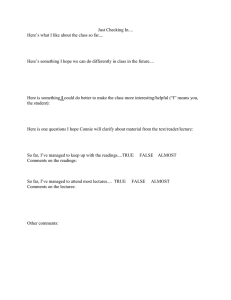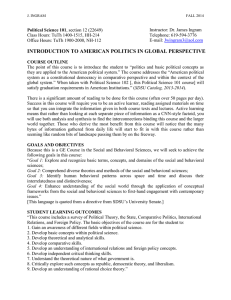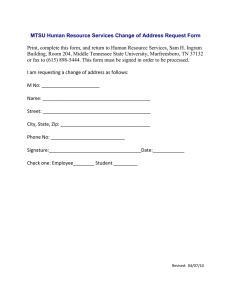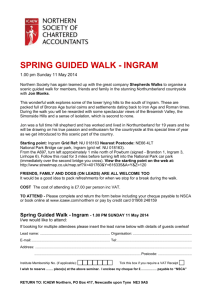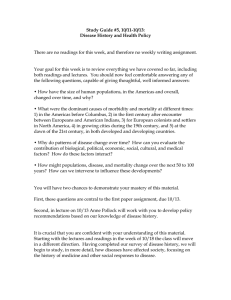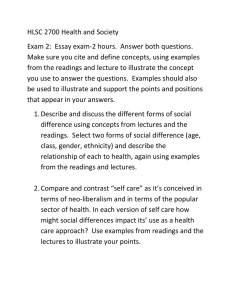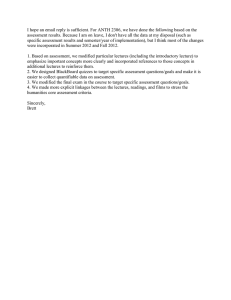Instructor: Dr. James Ingram Telephone: 619-594-3776 Class Hours: Th 1600-1840, PG-242
advertisement
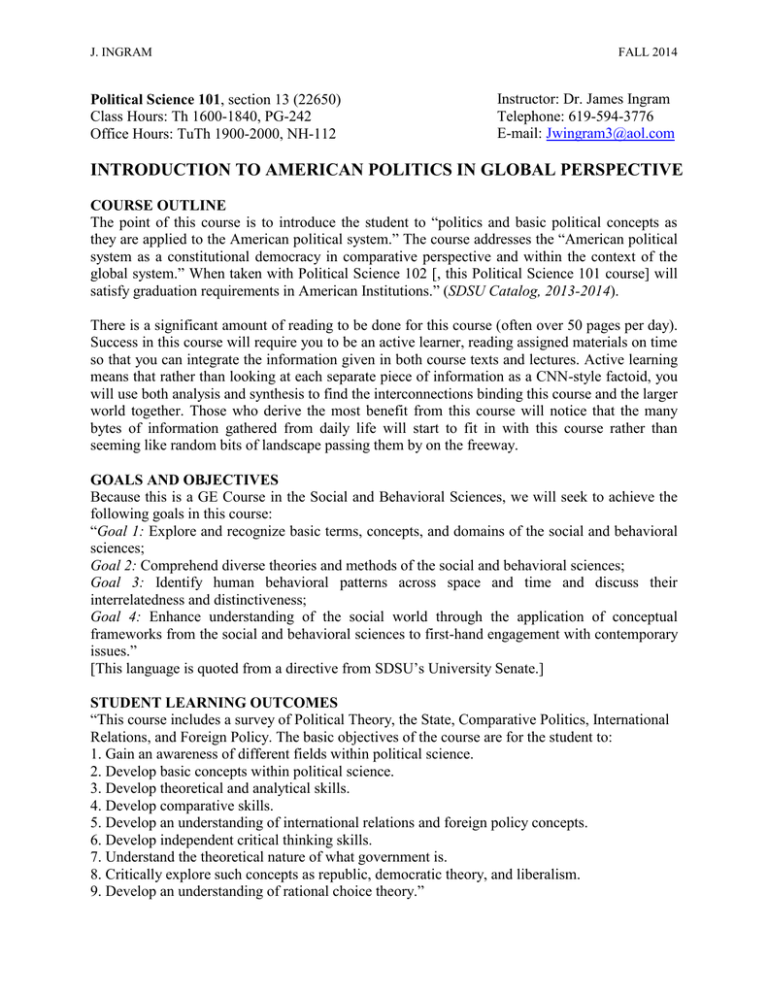
J. INGRAM Political Science 101, section 13 (22650) Class Hours: Th 1600-1840, PG-242 Office Hours: TuTh 1900-2000, NH-112 FALL 2014 Instructor: Dr. James Ingram Telephone: 619-594-3776 E-mail: Jwingram3@aol.com INTRODUCTION TO AMERICAN POLITICS IN GLOBAL PERSPECTIVE COURSE OUTLINE The point of this course is to introduce the student to “politics and basic political concepts as they are applied to the American political system.” The course addresses the “American political system as a constitutional democracy in comparative perspective and within the context of the global system.” When taken with Political Science 102 [, this Political Science 101 course] will satisfy graduation requirements in American Institutions.” (SDSU Catalog, 2013-2014). There is a significant amount of reading to be done for this course (often over 50 pages per day). Success in this course will require you to be an active learner, reading assigned materials on time so that you can integrate the information given in both course texts and lectures. Active learning means that rather than looking at each separate piece of information as a CNN-style factoid, you will use both analysis and synthesis to find the interconnections binding this course and the larger world together. Those who derive the most benefit from this course will notice that the many bytes of information gathered from daily life will start to fit in with this course rather than seeming like random bits of landscape passing them by on the freeway. GOALS AND OBJECTIVES Because this is a GE Course in the Social and Behavioral Sciences, we will seek to achieve the following goals in this course: “Goal 1: Explore and recognize basic terms, concepts, and domains of the social and behavioral sciences; Goal 2: Comprehend diverse theories and methods of the social and behavioral sciences; Goal 3: Identify human behavioral patterns across space and time and discuss their interrelatedness and distinctiveness; Goal 4: Enhance understanding of the social world through the application of conceptual frameworks from the social and behavioral sciences to first-hand engagement with contemporary issues.” [This language is quoted from a directive from SDSU’s University Senate.] STUDENT LEARNING OUTCOMES “This course includes a survey of Political Theory, the State, Comparative Politics, International Relations, and Foreign Policy. The basic objectives of the course are for the student to: 1. Gain an awareness of different fields within political science. 2. Develop basic concepts within political science. 3. Develop theoretical and analytical skills. 4. Develop comparative skills. 5. Develop an understanding of international relations and foreign policy concepts. 6. Develop independent critical thinking skills. 7. Understand the theoretical nature of what government is. 8. Critically explore such concepts as republic, democratic theory, and liberalism. 9. Develop an understanding of rational choice theory.” J. INGRAM PAGE 2 FALL 2014 [Quoted from URL http://www5.austincc.edu/faculty/syllabus.php?id=221292 as accessed on January 23, 2013]. COURSE THEMES Although many students have learned some of the basic details of the United States’ political system from their secondary schools, few students arrive at the university educated about the United States in terms of a global perspective. As evidence, note the very title of this class, taken from SDSU’s general catalog. Is the United States the only country in America? The last time I checked, North America also included Canada and Mexico, to say nothing of Central or South America. Yet even people who should know better use the term “American” as if it were an adjective describing only those things connected to the United States. Clearly, a global perspective is badly needed by those who want to understand U.S. politics. This class is an introduction not only to American politics, but to political science in the broader sense, which also includes the fields of political theory, comparative politics and international relations. After taking this course, students may specialize by taking classes drawn from the curricula of any of these four areas (American, Comparative, IR and Theory), but Political Science 101 is the last course which allows a broad analytical synthesis of the various components of political science as a coherent discipline. Although we will discuss countries and cases drawn from throughout human history and around the world, the United States will be a constant touchstone as it is the benchmark against which most SDSU students would measure and understand other polities. Students should always remember that the topics for the course can be controversial and that there is no clear consensus of opinion on many of them. Is a capitalist democracy the best country and one to which all human societies should aspire? The U.S. news media seem to treat the answer to this question as obvious, but a real political scientist cannot. Some of the course materials you will be reading and the lectures I will be giving may disturb you because they seem to question the verities you have been taught elsewhere. Critical thinking requires that we expose our philosophical positions to close scrutiny because, as Socrates is reported to have said, “the unexamined life is not worth living.” You may finish the class with your positions unchanged from their status quo ante. But hopefully, you will be able to better state what those positions are, defend them to others without similar beliefs, and understand why they are important to you. If I were to hold a position merely due to an ideological prejudice, or because someone repeated it to me frequently enough, this would mean that I could never persuade another person to adopt my perspective. Such a circumstance would be more appropriate for a mindless automaton than for a citizen of a democratic republic. COURSE REQUIREMENTS Your course grade will be based on two midterm exams, a final, and participation. Each examination will consist of two parts, one multiple-choice and one written, with each of these components worth 15% of the course grade. Thus, the first midterm, second midterm and final exam will each be worth 30% of the course grade. The participation component will comprise the remaining 10% of your course grade. Both the multiple-choice and written components of your three exams will be drawn from a study guide posted in advance. You must take examinations J. INGRAM PAGE 3 FALL 2014 using an 882 type Scantron and a number 2 pencil, as well as a pen. The final examination will be comprehensive. There is no extra credit for this class. However, I will award 10% of the points for the course based on attendance and participation. I will be giving pop quizzes, doing lectures and showing films during class time. Periodically, I will take attendance, and if you are not in class, you will be penalized. I will also use this 10% as a way to address unsatisfactory conduct, which includes disrupting class through early departures and late arrivals, as well as undesirable noise caused by students chattering with one another during my lectures. In addition to this 10%, class participation usually benefits students in other course components, such as exams and the essay. Some of the course participation may be submitted through Turnitin to ensure that students avoid academic dishonesty. “Students agree that by taking this course all required papers may be subject to submission for textual similarity review to Turnitin for the detection of plagiarism. All submitted papers will be included as source documents in the Turnitin reference database solely for the purpose of detecting plagiarism of such papers. You may submit your papers in such a way that no identifying information about you is included. Another option is that you may request, in writing, that your papers not be submitted to Turnitin. However, if you choose this option you will be required to provide documentation to substantiate that the papers are your original work and do not include any plagiarized material.” If any student has difficulty in understanding these course requirements, he or she should communicate with the instructor immediately in office hours or via email. In the interests of fairness, students should understand exactly what is expected of them. This syllabus is this class’s constitution, the social contract between students and the instructor. Since students will be bound by it and graded accordingly, no one should take the course if he or she does not understand what is expected. That would be analogous to signing a contract without reading or understanding its terms. Both the students and the instructor are also bound by all of SDSU’s relevant policies and procedures regarding proper conduct and student-instructor interaction. The rules of common courtesy and decency will apply in all class settings; if any student is unaware of what these are, he or she should request clarification from the instructor. I do require that you observe proper classroom etiquette. If you are going to surf the net on your computer, please sit in the back row of class so as not to disturb others. There are to be no private conversations during class time. I only ask that if you must leave a class before a lecture is over, you do it quietly and unobtrusively so that you do not disturb the learning of your fellow students. As a diverse community of learners, students must strive to work together in a setting of civility, tolerance, and respect for each other and for the instructor. The rules for proper classroom behavior (which apply to online as well as onsite courses) include but are not limited to the following: -Conflicting opinions among members of a class are to be respected and responded to in a professional manner; -There are to be no offensive comments, language, or gestures; -Please use culturally sensitive language when discussing or writing about all people groupings covered in the class; slurs and epithets are unacceptable. J. INGRAM PAGE 4 FALL 2014 Students are permitted to form study groups in order to prepare for exams, but the exams are not a collective performance. Group work during exams will constitute evidence of academic dishonesty. If students turn in substantially identical work, or work that resembles materials from improperly cited sources including the Internet, the instructor will then look for evidence of plagiarism and other forms of academic dishonesty. As per university policy, I do want to make it clear that it is NOT acceptable to turn in work that you have drafted in a previous or concurrent class to satisfy your essay requirements for this class. For the purpose of this course, that is academic dishonesty. Any student who commits plagiarism or any other form of academic dishonesty will fail this class, and may face further action by the appropriate university officials. This syllabus establishes the dates for all exams and essays. Unless in the case of verified illness or emergency, these deadlines are not negotiable. Exceptions are discriminatory and make the course unfair for students who are not granted special treatment. Late work will be penalized a half-grade for the first hour it is late, and a full grade per day thereafter! COURSE DEADLINES AND GRADE CALCULATION COMPONENT DATE PORTION OF COURSE First Midterm-MCs September 25 15% First Midterm-written September 25 15% Second Midterm-MCs October 30 15% Second Midterm-written October 30 15% Final Exam-MCs December 11 15% Final Exam-written December 11 15% Participation TBA 10% Course Grade N/A 100% STUDENTS WITH DISABILITIES If you are a student with a disability and believe you will need accommodations for this class, it is your responsibility to contact Student Disability Services at (619) 594-6473. To avoid any delay in the receipt of your accommodations, you should contact Student Disability Services as soon as possible. Please note that accommodations are not retroactive, and that accommodations based upon disability cannot be provided until you have presented your instructor with an accommodation letter from Student Disability Services. Your cooperation is appreciated. REQUIRED READINGS 1. Dooley, Kevin and Joseph Patten, Why Politics Matters: An Introduction to Political Science, 2nd Edition, Stamford, CT.: Cengage Learning, 2015. 2. Ingram Reader, Cengage Learning 2014. (Each of the readings online in this source should be read by the deadline that is specified in the Ingram Reader. 3. Any additional materials I will place on Blackboard for you to read and study. SCHEDULE OF LECTURES AND READING ASSIGNMENTS A note on synchronizing lectures and readings: Please read all materials prior to class, if possible. At the 1st meeting, this is obviously not possible, as students may not yet have purchased the textbook, and were certainly unaware of the assignment. J. INGRAM PAGE 5 FALL 2014 Unit One—August 28 Lectures: Coverage of Syllabus and Course Concepts; What is Politics and why is it important? Readings: The U.S.’s Declaration of Independence (available on Blackboard for the course), Dooley, Chapter 1; Ingram Reader. Unit Two—September 4 Lectures: The ancients and their theories on politics. Readings: Dooley, Chapter 2; Ingram Reader. Unit Three—September 11 Lectures: Modern political theorists. Readings: Dooley, Chapter 3; Ingram Reader. Unit Four—September 18 Lectures: Modern Political Theory II: Marx and Weber. Readings: The Communist Manifesto; “Politics as a Vocation” (Blackboard); Ingram Reader. Unit Five—September 25 FIRST MIDTERM EXAMINATION Please bring a Form 882 Scantron and #2 pencil to class, as well as a pen. I will do an online study session prior to the examination, at a time to be announced. Unit Six—October 2 Lectures: The Benchmark Case: Politics in the United States. Readings: Dooley, Chapter 4; United States Constitution (Blackboard); Ingram Reader. Unit Seven—October 9 Lectures: Legislatures in comparative perspective. Readings: Dooley, Chapter 5; Lijphart chapter (Blackboard); Ingram Reader. Unit Eight—October 16 Lectures: Executives in comparative perspective—Parliamentary vs. Presidential Systems. Readings: Dooley, Chapter 6; Ingram & Cox reading (Blackboard); Ingram Reader. Unit Nine—October 23 Lectures: A comparative perspective on judiciaries: Marbury and judicial review. Readings: Dooley, Chapter 7; Corwin reading (Blackboard); Ingram Reader. J. INGRAM PAGE 6 FALL 2014 Unit Ten—October 30 SECOND MIDTERM EXAMINATION Please bring a Form 882 Scantron and #2 pencil to class, as well as a pen. I will do an online study session prior to the examination, at a time to be announced. Unit Eleven—November 6 Lectures: Non-Democracies—compliance without consent in authoritarian states. Readings: Dooley, Chapter 8; Dahl and Putnam essays in Ingram Reader. Unit Twelve—November 13 Lectures: View Stanley Kubrick’s classic film, Dr. Strangelove in class and submit review. Readings: Dooley, Chapter 9; Benedict Anderson on Imagined Communities (Blackboard); Ingram Reader. Unit Thirteen—November 20 Lectures: Balance of power politics and the emergence of the modern state system. Readings: Dooley, Chapter 10; Hendrik Spruyt essay (Blackboard); Ingram Reader. Unit Fifteen—December 4 Lectures: Is the Nation-State Really Over? The Globalization-Localization Paradox. Readings: Dooley, Chapter 11; Barber essay on “Jihad vs. McWorld” in Ingram Reader. Unit Sixteen—December 11 FINAL EXAMINATION The Final will be held in our classroom on Thursday at 1600-1800. Please bring a Form 882 Scantron and a #2 pencil, as well as a pen, to the final exam. I will do an online study session prior to the examination, at a time to be announced.
